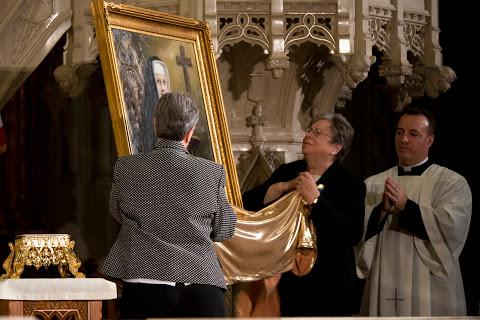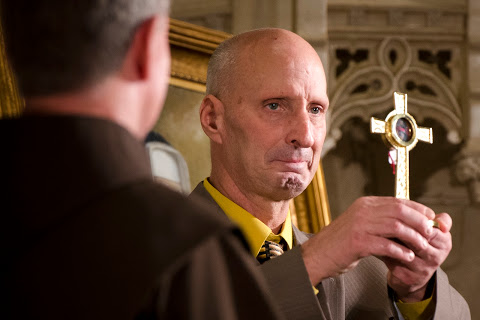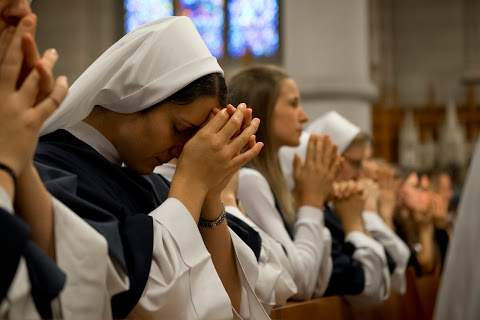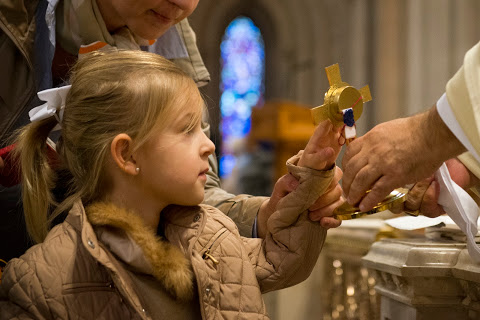Blessed Miriam Teresa Demjanovich Taught the Universal Call to Holiness Decades before Vatican II
Lenten Campaign 2025
This content is free of charge, as are all our articles.
Support us with a donation that is tax-deductible and enable us to continue to reach millions of readers.
The Beatification Mass in Newark’s Cathedral Basilica of the Sacred Heart, acknowledging Blessed Miriam Teresa Demjanovich’s place in heaven, made for a spectacular day of “firsts”: the first beatification taking place in the United States; the first American blessed from New Jersey; and the first American blessed of the Catholic Ruthenian-Byzantine Rite.

Cardinal Angelo Amato, Prefect of the Congregation for the Causes of Saints was the Principal Celebrant. He was joined by the Papal Nuncio to the United States, Archbishop Carlo Maria Viganò, Archbishop John J. Myers (Newark) and the homilist, Bishop Arthur J. Serratelli, Bishop of Paterson, NJ, where the Sisters of Charity of St. Elizabeth have their Mother House and where Blessed Teresa was in formation when she died.
In a sign of the unity of the Eastern and Western Church, the Most Reverend Kurt Burnette, Eparch of the Ruthenian-Byzantine Eparchy of Passaic also took part in the liturgy. Although Blessed Teresa was a novice in the Roman Catholic Sisters of Charity (founded by St. Vincent De Paul), she was permitted to make her religious profession “in articulo mortis” (in danger of death) one month before she died on May 8, 1927, without having received an official transfer to the Roman Rite.

Michael Mencer, whose near blindness from juvenile macular degeneration was cured in 1964 through the intercession of Blessed Miriam Teresa when he was eight years old, carried a reliquary containing a lock of Sister Teresa’s hair in procession. It will remain in a chapel of the Cathedral Basilica.
The Postulator for her Cause offered a biographical sketch which confirmed the essential role of the family in bringing up the next generation in faith. Blessed Teresa was the youngest of 7 children and
After graduation it was the decision of the family that she remain at home to care for their ailing mother. This she did willingly and well,
summa cum laude
with a bachelor’s degree in literature.
She taught school for a time, praying to discern her vocation. Again, consulting her family, they suggested that she “use her education to serve God in a teaching order.” She became a postulant and then novice in the Sisters of Charity of St. Elizabeth in 1925.
As a novice, she taught at the Academy of St. Elizabeth and it was during this time, that her spiritual director ― recognizing her spiritual depth and mystical insights, asked her to write a series of 26 conferences on the spiritual life which he gave to the other novices. Her brother, Father Charles Demjanovich, published the conferences as “Greater Perfection: Being the Spiritual Conferences of Sister Miriam Teresa” one year after her death.
The Gospel passage chosen for her beatification Mass (John 14: 19-23) was fitting ― “Whoever loves me will keep my word and my Father will come to him and we will dwell with him ― because Blessed Teresa described the purpose God had given her as this:

She was ever conscious of the indwelling of the Holy Trinity in her soul.
In his homily, Bishop Serratelli stated that, in the midst of a century of extraordinary brutality, war and genocide, “God was at work, showing us” a better way.
When she was born in 1901, when Marconi [was pioneering in long-distance radio transmission], God was showing us how to be in constant contact with Him through [the the witness of] Blessed Miriam: “that doing God’s will in all things bridges the distance between heaven and earth.”
Bishop Serratelli observed that “while the work of the Church is slow in making saints, not so for God. Her life spanned only 26 years. From her entrance into the Sisters of Charity, only 28 months.”
And that was all God needed to sanctify her because she understood and wrote this: “The saints did but one thing, the will of God, but they did it with all their might.”
She “was careful never to offend God and to serve him by knowing him and doing his will. Filled with the knowledge of Sacred Scripture, she anticipated the Second Vatican Council’s [call to know] the word of God.”
Blessed Teresa understood that “union with God is the spiritual height God calls everyone to achieve. Anyone, not only religious, anyone who says yes constantly to God.”
The imitation of Christ … is always possible and compatible with every state in life. At a time when many would like a faith without creeds, God has given us a Blessed who [was content] not simply to know the truth but to know, love and serve the Truth, which is God himself.
Forty years after her death, in Lumen Gentium, the Church echoed the universal call to holiness expressed in a letter Blessed Teresa wrote to her spiritual director:

Susan E. Wills
is spirituality editor of Aleteia’s English language edition.







